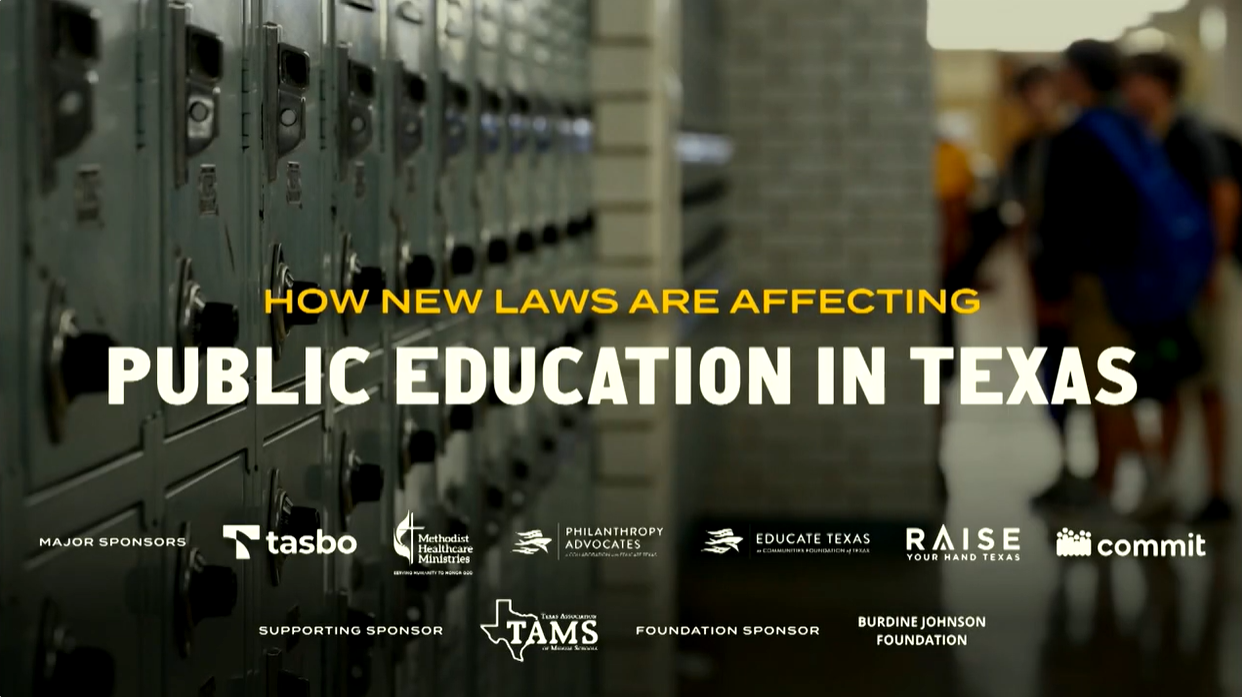Texas Tribune hosts panel on the impact of new legislation on Texas public education

Date Posted: 4/16/2024 | Author: Tricia Cave
The Texas Tribune hosted a panel Tuesday titled “How New Laws are Affecting Public Education in Texas.” The panel, moderated by education and urban affairs editor Alejandro Martinez-Cabrera, included Gabe Grantham, policy analyst at Texas 2036; Sharla Horton, director of Texas strategic support at Education Resource Strategies; Jennifer Saenz, senior director of communications and policy at E3 Alliance; and Gonzalo Salazar, superintendent of Los Fresnos CISD.
The hourlong conversation focused primarily on the need for and impact of three pieces of legislation passed in 2023: SB 2124 by Senate Education Chairman Brandon Creighton (R–Conroe), which created an advanced mathematics program for students in middle school in an effort to increase the number of students in high school advanced math; HB 1605 by House Public Education Chairman Brad Buckley (R–Salado), which allows the state to develop and distribute “High-Quality Instructional Materials (HQIM)” to school districts that choose to implement them, with a stipend for districts that do so; and HB 1416 by Rep. Keith Bell (R–Forney), which implements some changes to the accelerated instruction mandated by HB 4545 in a previous session.
The panel spent considerable time discussing math achievement and the need for STEM skills in the workforce due to the high-tech industries currently booming in Texas. Investment in quality math instruction is one of the largest predictors of workforce success for our children. The panel expressed concern that Texas is not currently producing enough students with the advanced math skills needed to grow into the high-level manufacturing jobs Texas is attracting, thus forcing those industries to look out of state and even out of the country for candidates. SB 2124 seeks to address this issue by creating a middle school advanced math pathway that legislators hope will lead to an increase in high school enrollment in advanced math courses.
One important way to help students is to help teachers, Salazar stressed. He pointed out that investing in the well-being and mental health of teachers was crucial in helping them address students’ post-pandemic needs through prescriptive interventions. The sales pitch for HB 1605 was to help overwhelmed teachers find on grade-level resources for their students and to cut the time many educators, particularly novice teachers, spend lesson planning. Panelists cited studies showing that resources are often two to three grade levels below where they should be. The hope is that providing vetted resources to educators and potentially reducing their planning time will help educators become more effective and bring their instruction up to grade level.
Taking a different view, Salazar noted that while scripted curriculum can be beneficial for new teachers, the HQIM under HB 1605 is being promoted as a way to take the burden of planning away from teachers. (Note: “HQIM” is a program name, not a description.) This raises concerns that teachers won’t be able to grow and challenge themselves in lesson design, which is one of the best and most creative aspects of the field. Salazar described lesson planning as “flexing an educator’s muscles.” In that analogy, the system envisioned under HB 1605 is like a crutch. While there may be times when a crutch is helpful or even necessary, overuse of one ultimately causes atrophy. Planning lessons for the students who are actually in the room is just as important as planning to meet the standards, and teachers need mentorship, support, and collaboration with other educators in order to grow and become stronger educators—not to have the ability to fully exercise their craft stripped away.
Lastly, the panel discussed the potential impact of HB 1416, which was written to correct some issues that arose from the passage of HB 4545 in 2021. HB 4545 was intended to provide tutoring and accelerated instruction for students who were unsuccessful on the STAAR test. The law mandated 30 hours of accelerated instruction per subject in which the student was unsuccessful, with a student-to-teacher ratio of 3:1 for these sessions. Districts across the state expressed concern with the bill, stating that the requirements were extremely difficult to implement and strained their resources. HB 1416 was designed to ease the burden on educators, reducing the required tutoring hours from 30 to 15 and changing the student-to-teacher ratio to 4:1. Salazar thanked the Legislature for the course correction but stressed the need for teachers to have flexibility in designing the tutorials to meet the needs of students. Horton, however, while agreeing that implementation of HB 4545 was difficult, expressed concern that rolling back requirements would potentially keep Texas schools from realizing the full benefits of the tutoring prescribed by the original bill.
It is still too early to fully understand the impact these laws and others will have on Texas public schools. What is clear, however, is that public schools cannot successfully implement programs for which they have no funding, and districts are currently starving for resources and investment that will help students and teachers to experience success. The Legislature failed to provide additional funding to public schools this session, and districts are struggling with budgeting and potentially laying off staff. The best way to invest in the future of our state and our workforce is to invest in our public school educators. It is incumbent on the 89th Legislature to do just that when lawmakers convene next January.
CONVERSATION
RECOMMENDED FOR YOU

02/13/2026
Teach the Vote’s Week in Review: Feb. 13, 2026
Early voting for the March primary election begins Tuesday, Feb. 17, and runs through Friday, Feb. 27.

02/06/2026
Teach the Vote’s Week in Review: Feb. 6, 2026
A special election runoff in Texas Senate (SD) 9 results in a dramatic party flip in a Republican stronghold.

02/06/2026
Congress finally unveils long-awaited education budget after another brief government shutdown
Texas schools are receiving short-term stability in key federal supports but no new fiscal capacity to address growing student needs, staffing challenges, or service mandates.

